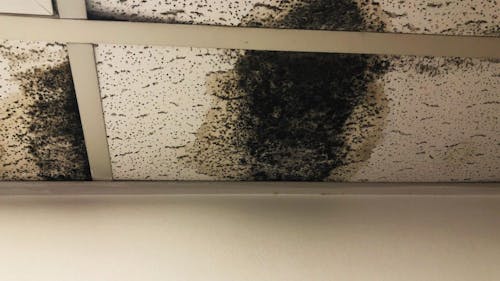Mold infestation found at Rutgers psychology building, faculty describe potentially dangerous work conditions

A mold infestation at the Rutgers Psychology Department building on Busch campus is forcing some faculty and student researchers out of their offices and into tightly packed spaces, limiting their ability to conduct research.
Faculty members claim they have been removed from or have had to relocate their offices. In addition, multiple rooms throughout the building have been damaged, including the administrative office for Rutgers’ recently established New Jersey Autism Center of Excellence.
Some rooms across the first and second floors have had their ceiling stripped exposing the building's infrastructure and electrical circuitry, while others brandish newly installed tiles that already show signs of water damage.
Upon entering the rooms, reporters with The Daily Targum documented notebooks and other personal items belonging to the sources in question that had spots of mold residue on them.

One lab, room 221, had half broken pieces of tile sprawled over a radiator with three recycling bins stacked on top to prevent water leaking from the ceiling from falling over. Each bin had mold growing inside.
Julien Musolino, an associate professor in the Department of Psychology, said the building’s mold issues date back to when he first started at Rutgers and beyond that — at least 10 years — but have recently gotten out of hand.
Rutgers spokesperson Dory Devlin said that as a result of humidity conditions in the Psychology Department building, the University has been actively addressing the concerns in the building since receiving complaints in late August and early September. Facilities performed a building assessment and is currently addressing the concerns presented by the occupants.
Pernille Hemmer, an associate professor in the Department of Psychology, said she first saw mold in her office in early August, growing out from behind her door. She said it was cleaned but has since grown back, and there is currently active mold in her office.
There is mold throughout the entire building. The problem now is that leaks from the windows and ceilings cause condensation within the building when the humidity gets too high, she said, which causes more mold.
Areas where mold has been identified are being cleaned and disinfected by IRS, Inc., an approved outside restoration vendor, Devlin said. The building is safe and suitable for occupancy. No parts of it are closed.
A few offices required more extensive remediation and their occupants were offered an alternate work location, she said. These offices have their own ventilation systems and do not affect the other areas of the building.
The situation came to a climax for Hemmer when she came to work yesterday and found her lab flooded.
She said she had to send students working in the lab home and is not certain when the lab will be open again.
“There is no solution in sight here,” Hemmer said. “So, I talked to the chair today, and he is working really really hard, he’s trying everything he can, but he is not the one who has to (create) the solution here. And I said to him, my only option today, I close my lab and I don’t know when we come back.”
Not being able to use labs and office buildings impacts the department’s ability to conduct research and act on grants that faculty have recently received, said Hemmer and Elizabeth Torres, an associate professor in the Department of Psychology and a leader of the New Jersey Autism Center of Excellence.

Torres said the office granted to the Autism center was infected with mold until it was “frozen” yesterday.
Even with the freezing, Targum reporters confirmed leaks have already begun to reappear on newly installed ceiling tiles.
Hemmer also said she recently received a National Science Foundation “career grant” for approximately $500,000. She said that the slow down could be detrimental, as faculty members have to report their work to the grant providers.
"My entire day today, on my faculty salary, was spent doing nothing, zero, that contributes toward the work that I am held responsible for, which is teaching, research and service,” Hemmer said. “… Today is just a snapshot in the life of this department since August, or even really before that.”
Torres and Hemmer said that Rutgers has made recent attempts to alleviate the situation.
They said workers have come to the building to freeze the mold in certain rooms and replace ceiling tiles.
Devlin said that consistent with the Centers for Disease Control and New Jersey Department of Health guidelines, an inspection of the areas and building systems was conducted and remediation work began immediately.
IRS, Inc. was contracted to provide dehumidification, disinfect areas where mold was identified and discard materials that could not be cleaned, she said. The company is in the process of completing the work.
Hemmer said the issue is that the mold continues to come back.
“I’m wondering if President (Robert L.) Barchi really thinks this is a good use of his money, because he is spending easy half a million dollars on faculty salaries for unproductive hours in a building that is beyond repair,” she said.
Editor's Note: This article has been updated to include comments from the University.



